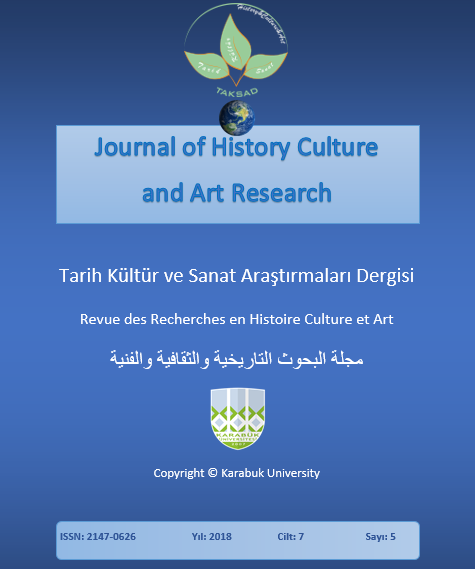The Unofficial Anthem of the Tatar People "Tugan Tel" as Political Discourse
DOI:
https://doi.org/10.7596/taksad.v7i5.1785Keywords:
National anthem, Musical nationalism, Political discourse.Abstract
The study of the anthem in forging national identity is a contemporary view, which allows us to consider the anthem as a historical source, which reflects both the historical memory and the national identity of the people. The song "Tugan tel", which was first performed in 1909, is passed on by Tatars from generation to generation as a folk tradition, as the symbol of national unity, thanks to which is perceived by the people as an anthem. This song brings together Tatars scattered around the world, helping each of them to feel a sense of ownership of the national origins, language and culture. In Soviet times, when national schools were closed, at various events of the Tatar public "Tugan tel" sang chorus as a protest against the national policy of the center. This song, which talks about the huge role and importance of the Tatar language in the preservation of national culture, has become particularly relevant and acute in connection with the socio-political events that took place in the second half of 2017 in the Republic of Tatarstan on the teaching of the Tatar language in schools. Since art is inextricably connected with a context of historical, social, political, and moral conditions, approaching these issues will be the subject of our discourse. We are also trying to answer the question of how historical memory, national identity, politics and music are related.
References
Adorno, T. (1976). Introduction to the Sociology of Music. Seabury Press, Music.
Akhunov, A. (2018). Tatar music. Tatar electronic library. 5 May, 2018 http://kitap.net.ru/ahunov6.php
Anderson, B. (1991). Imagined Communities: Reflections on the Origins and Spread of Nationalism. New York.
Gellner, E. (1964). Thought and Change. University of Chicago Press.
Historical and contemporary significance of the Christian missionary. (1894). Missionary anti-Muslim collection, Russia, Issue XX.
Khurmatullina, R.; Batyrshina, G.; Safiullina, L. & Blinova, J. (2017). Acoustic landscape of the old Tatаr settlement as a part of the Tatar culture. 4th International Multidisciplinary Scientific Conferences on Social Sciences and Arts SGEM, Bulgaria, Conference Proceedings. - Book 6, Volume II, pp.251-258.
Muftakhutdinova, D. & Khurmatullina, R. (2015). The Historical Memory of the Tatar People in The Works of Musical Culture. First Global Conference on contemporary issues in education (GLOBE-EDU 2014), USA, Procedia - Social and Behavioral Sciences, Volume 177, pp. 379-382.
Ozhegov, S. & Shvedova, N. (1999). The dictionary of the Russian language. Academy of Sciences, Russia.
Tatar folk art: Historical and lyrical songs. (1988). Russia.
The Concise Oxford Dictionary of Music (2018). Encyclopedia.com. 2 May, 2018. "Nationalism in Music." http://www.encyclopedia.com
The website "Idel.Realities" 1 May, 2018. https://www.idelreal.org
The website of the President of Russia. 1 May, 2018. http://www.kremlin.ru/events/president/news/55109
Wertheim, S. (2003). Language Ideologies and the “Purification” of Post-Soviet Tatar. Ab Imperio, 1, 347-369. DOI: 10.1353/imp.2003.0043
Wundt, W. (2018). Die Nationen und ihre Philosophie: Ein Kapitel zum Weltkrieg, Kr ner, Stuttgart. 5 May, 2018 https://openlibrary.org/works/OL1536302W/
Zoteyeva, T. S. (2013). National anthem as a genre of political discourse. Political linguistics, Russia, 1(43), 133-143.
Downloads
Published
How to Cite
Issue
Section
License
All papers licensed under Creative Commons 4.0 CC-BY.- Share — copy and redistribute the material in any medium or format
- Adapt — remix, transform, and build upon the material for any purpose, even commercially.
Under the following terms:
Attribution — You must give appropriate credit, provide a link to the license, and indicate if changes were made. You may do so in any reasonable manner, but not in any way that suggests the licensor endorses you or your use.
- No additional restrictions — You may not apply legal terms or technological measures that legally restrict others from doing anything the license permits.







